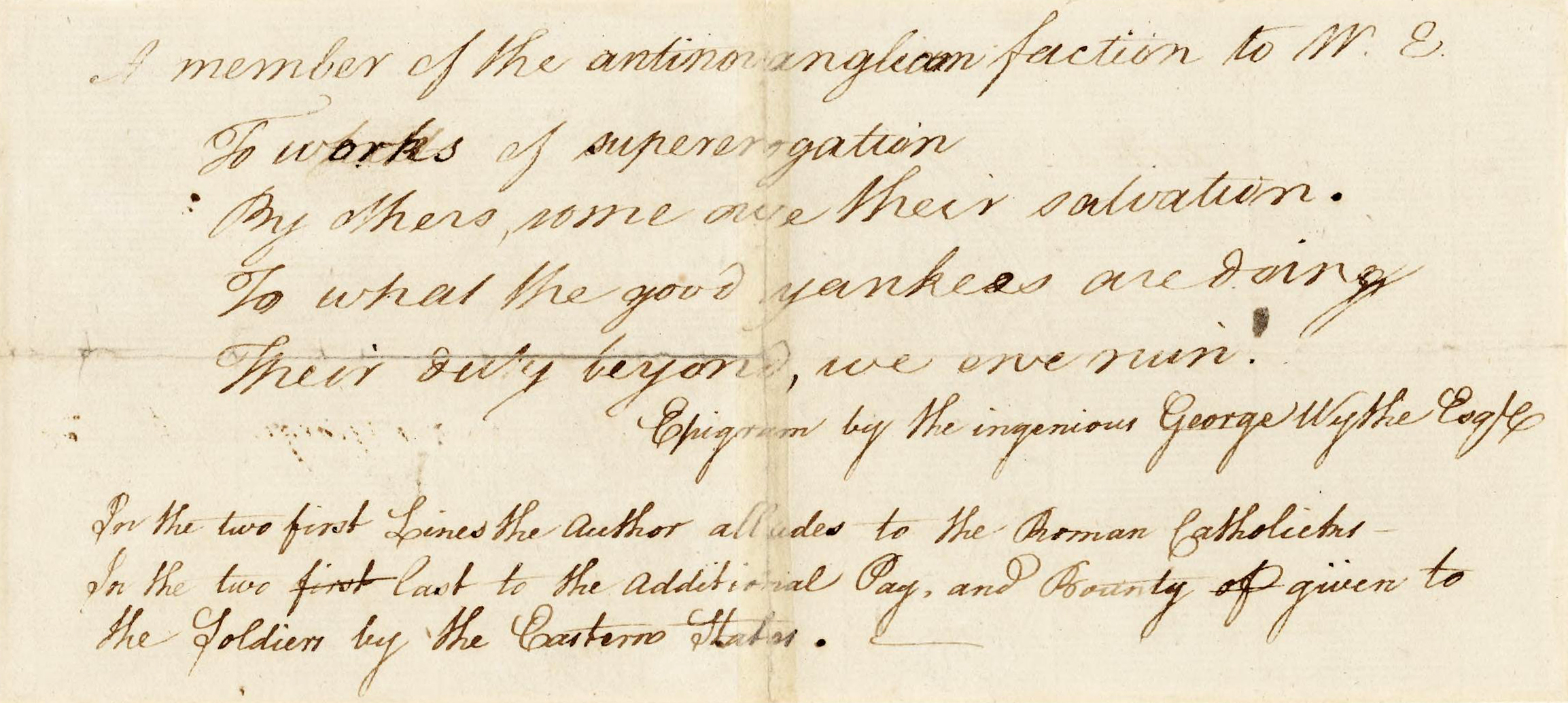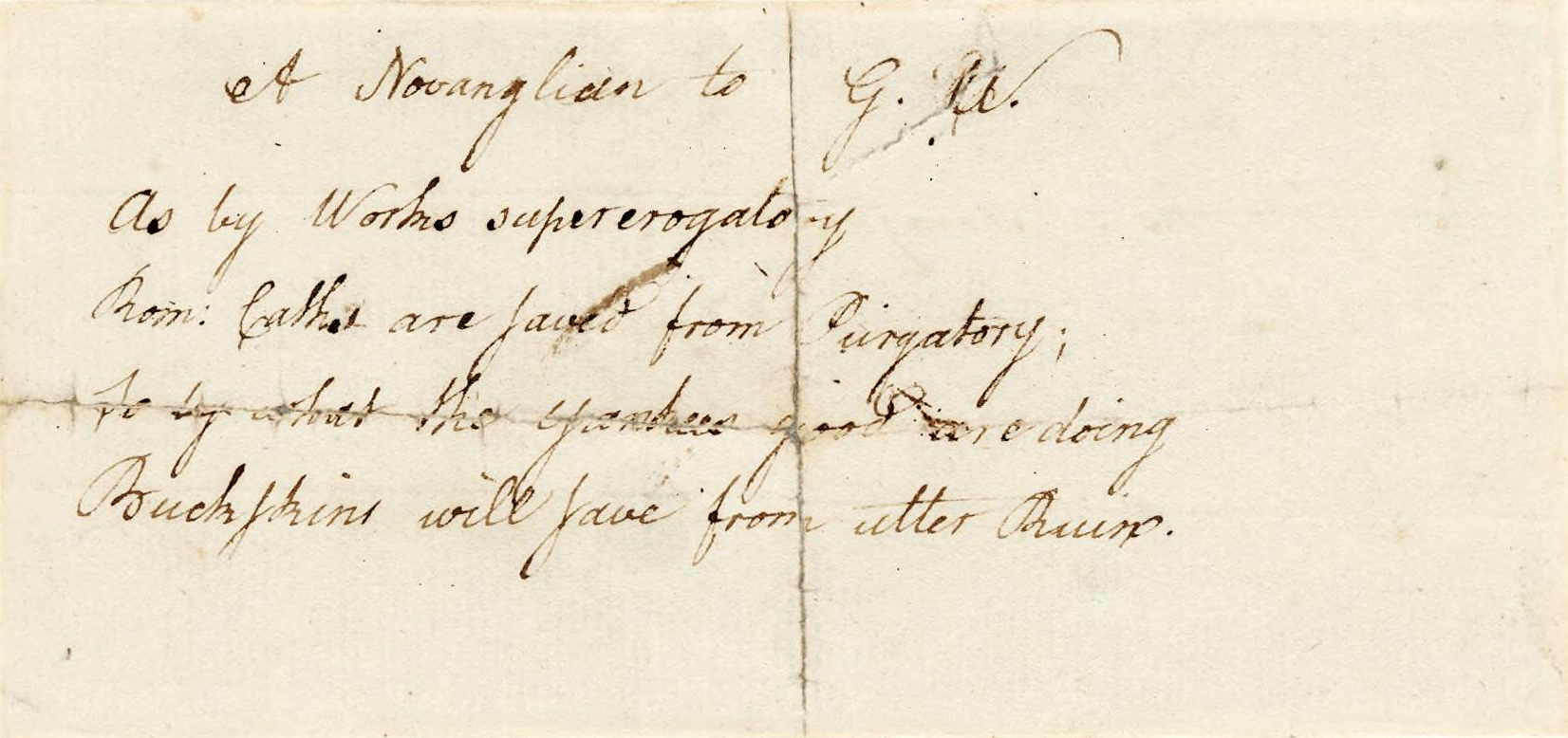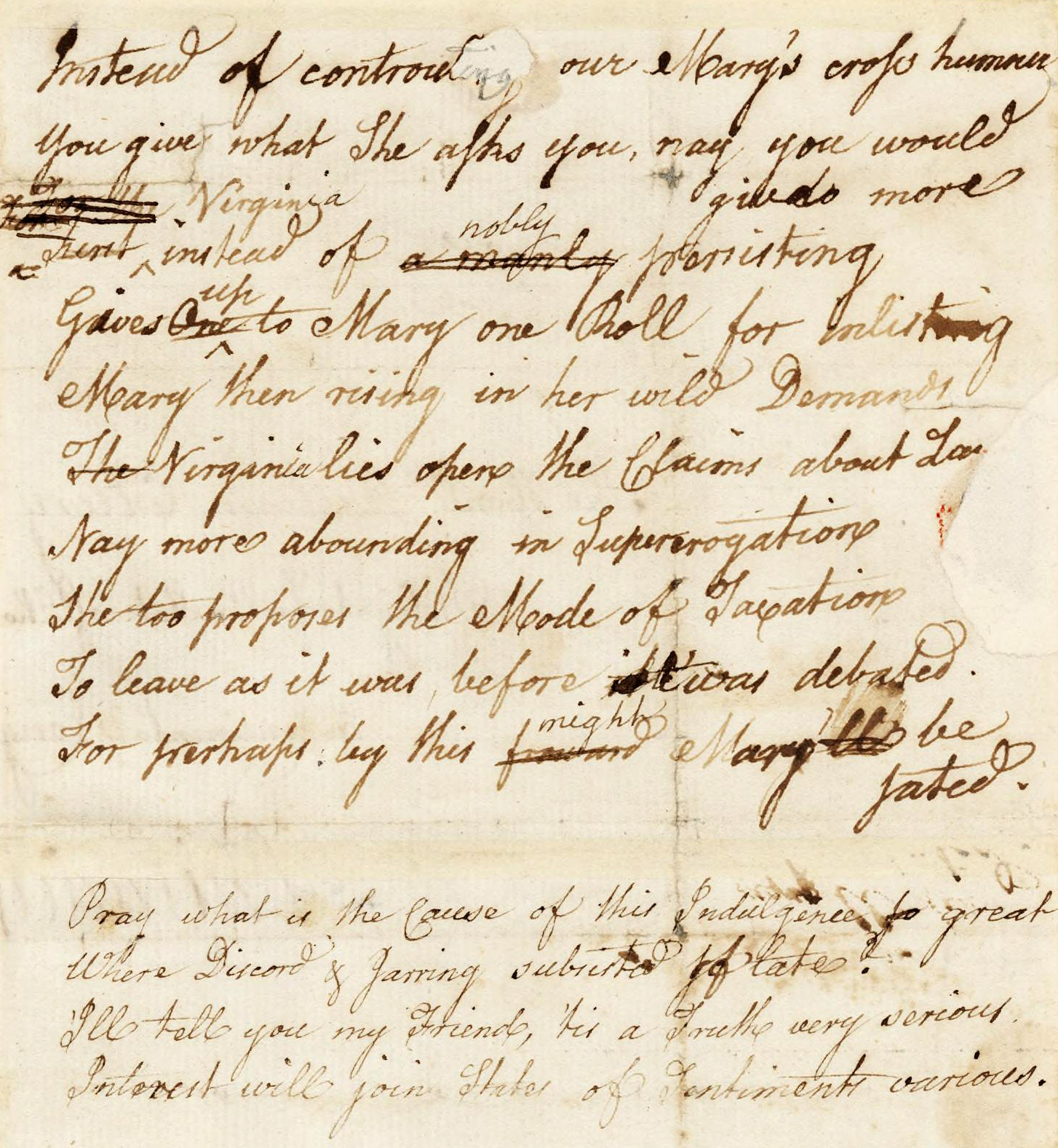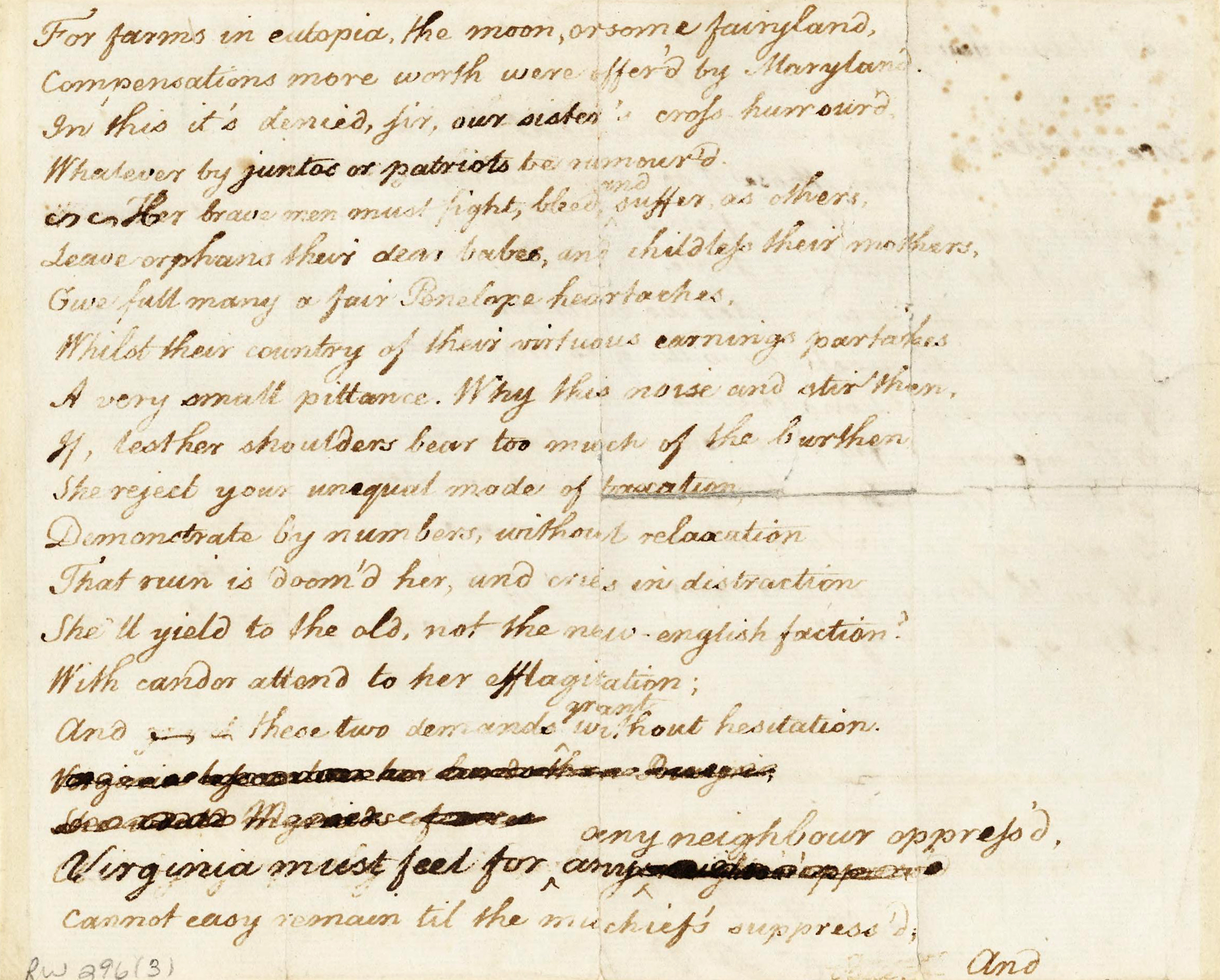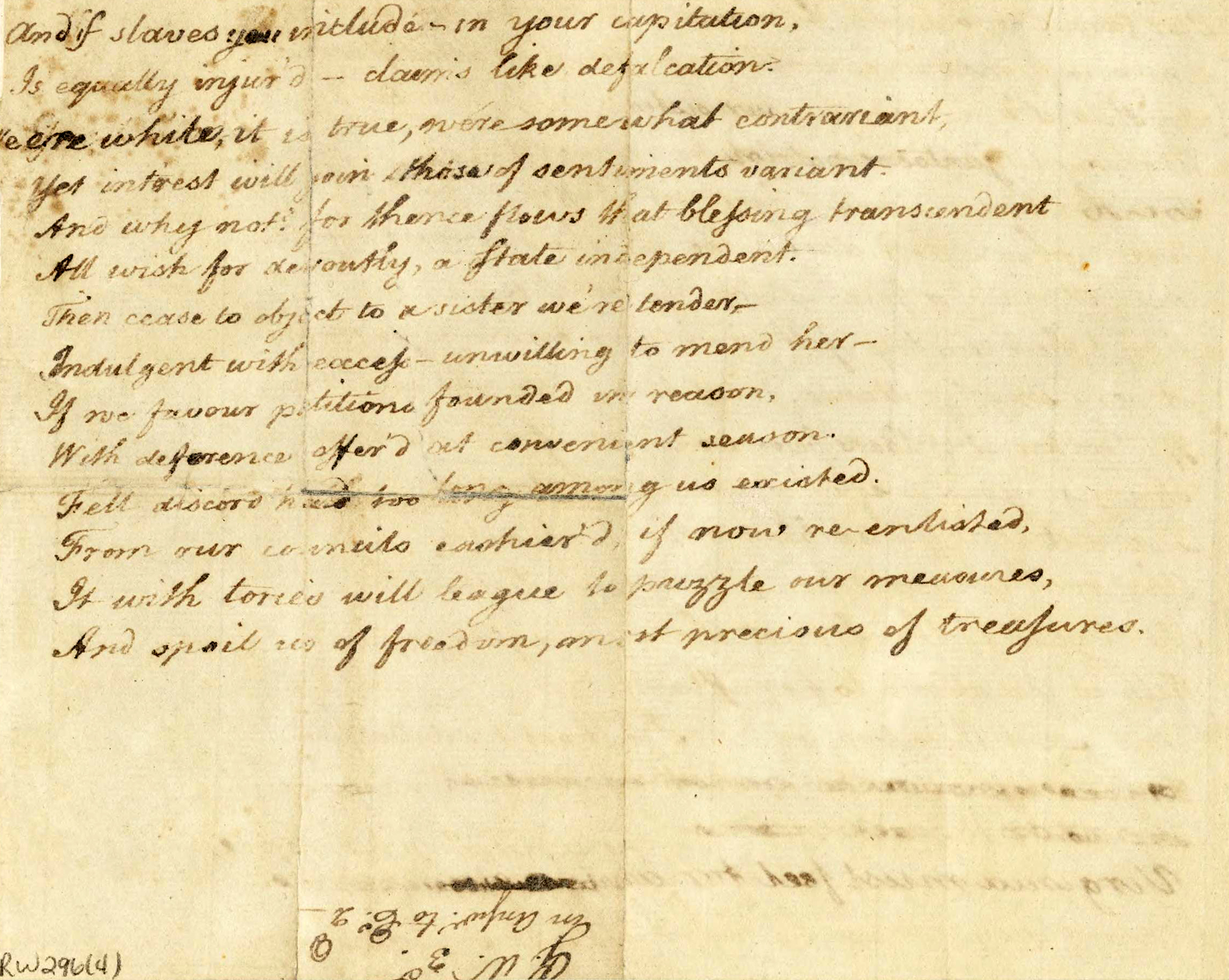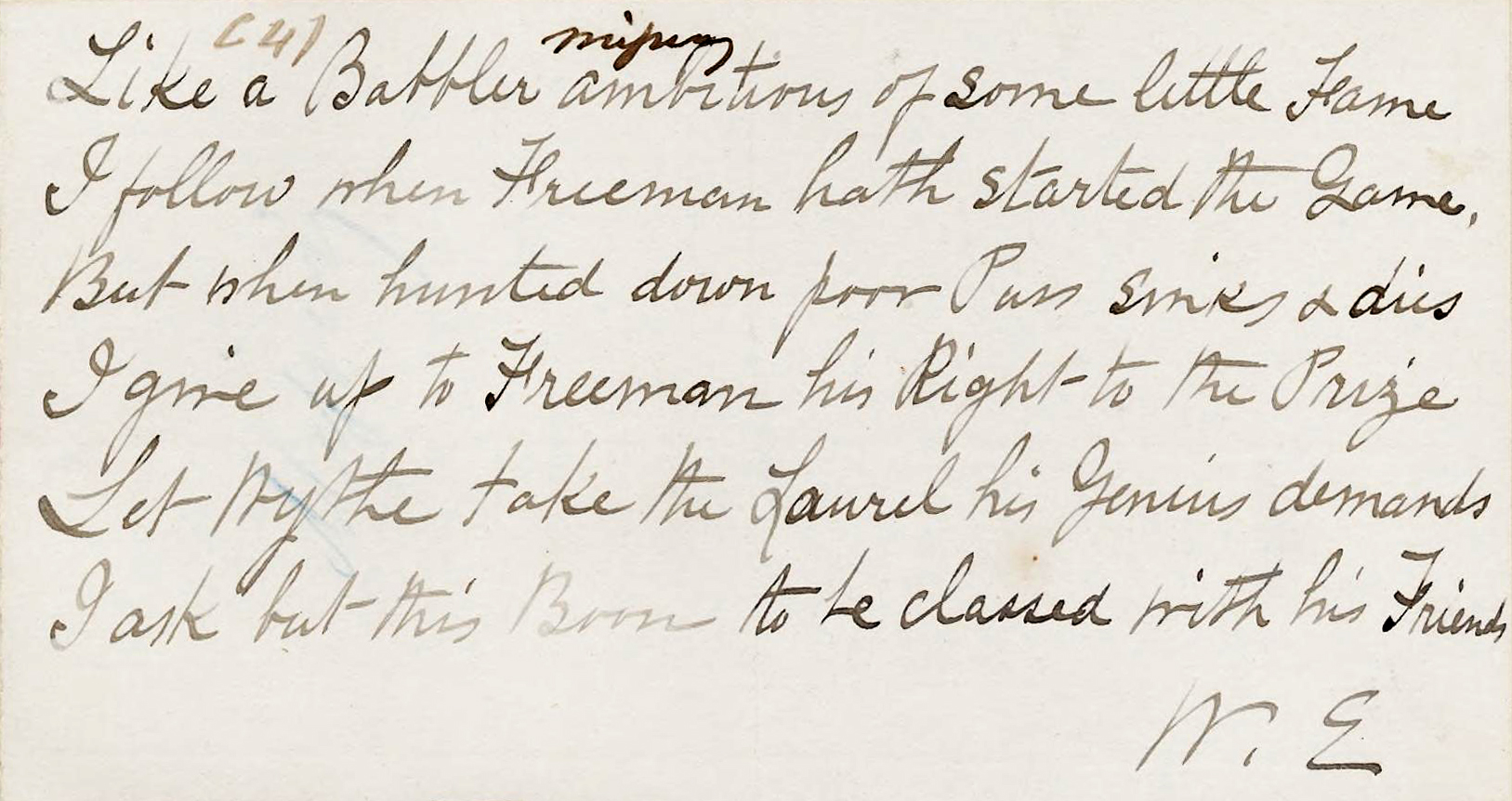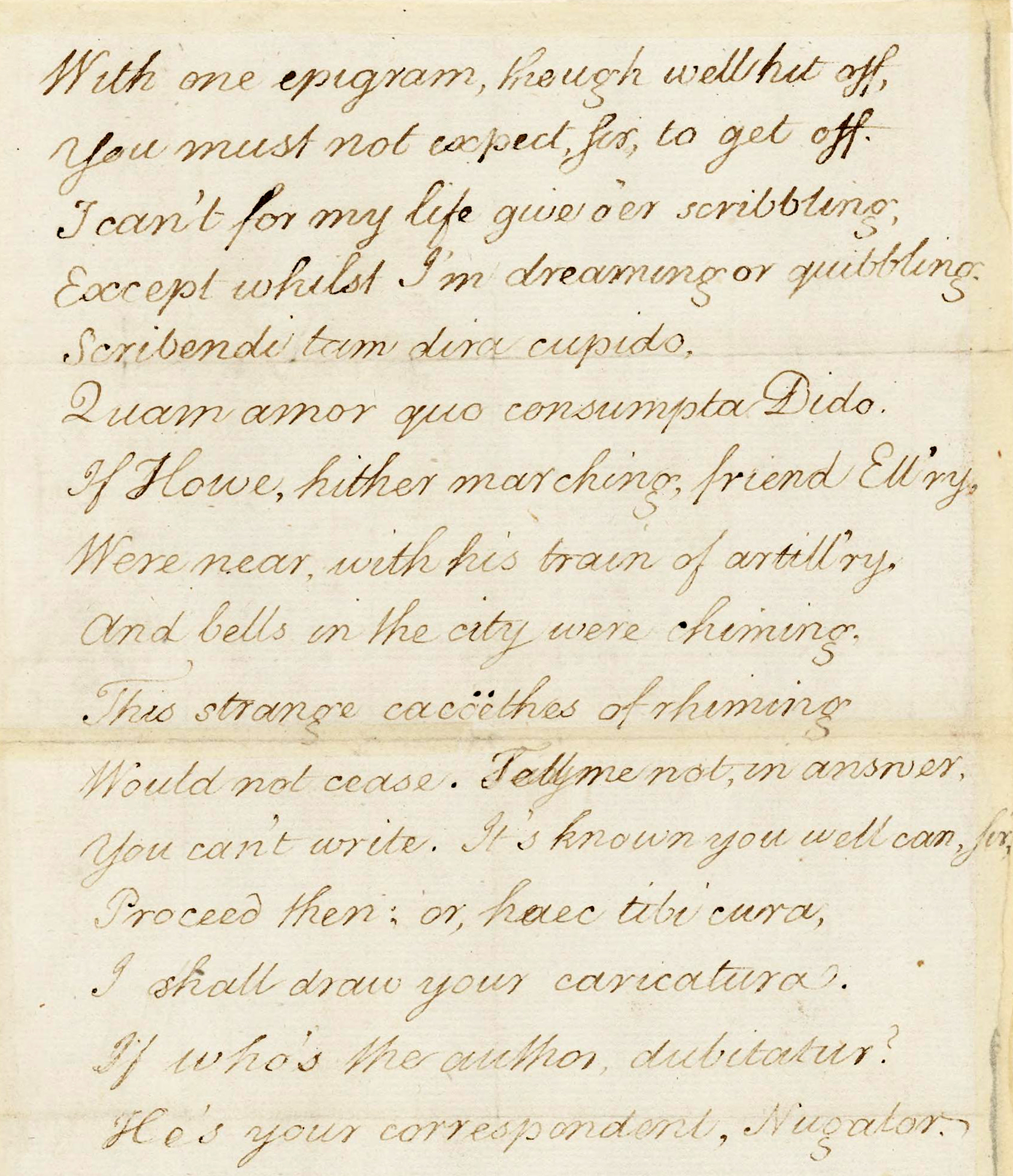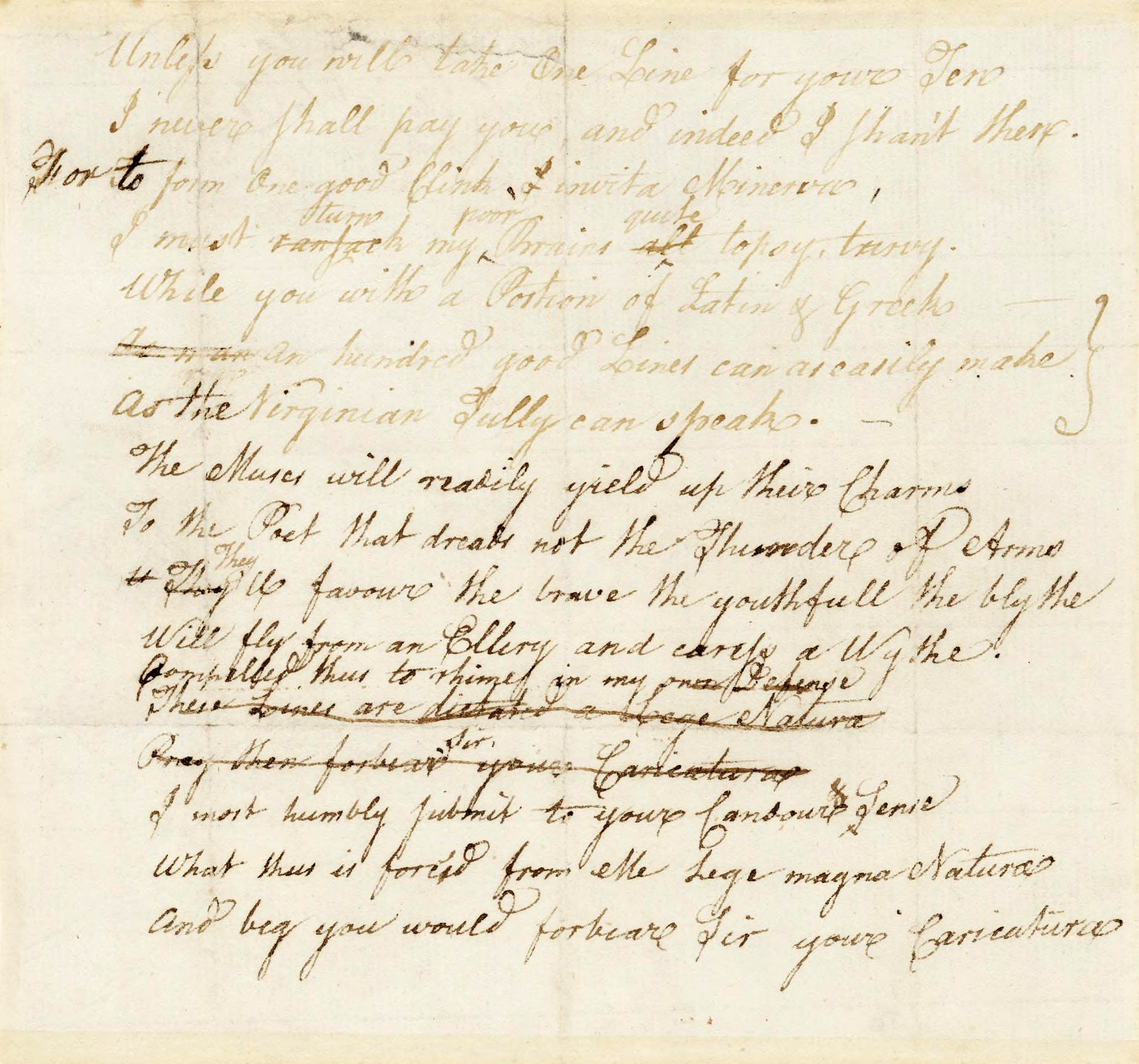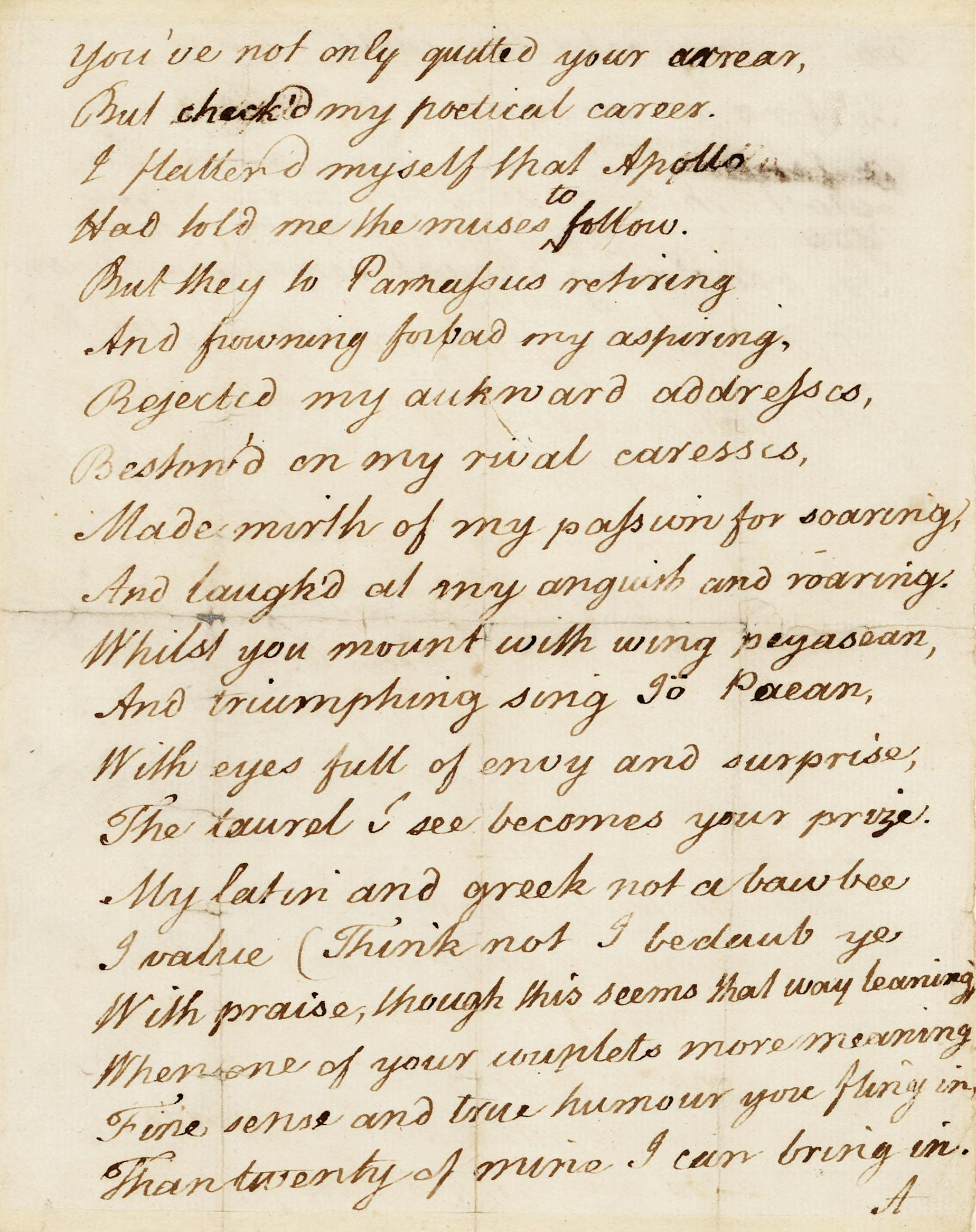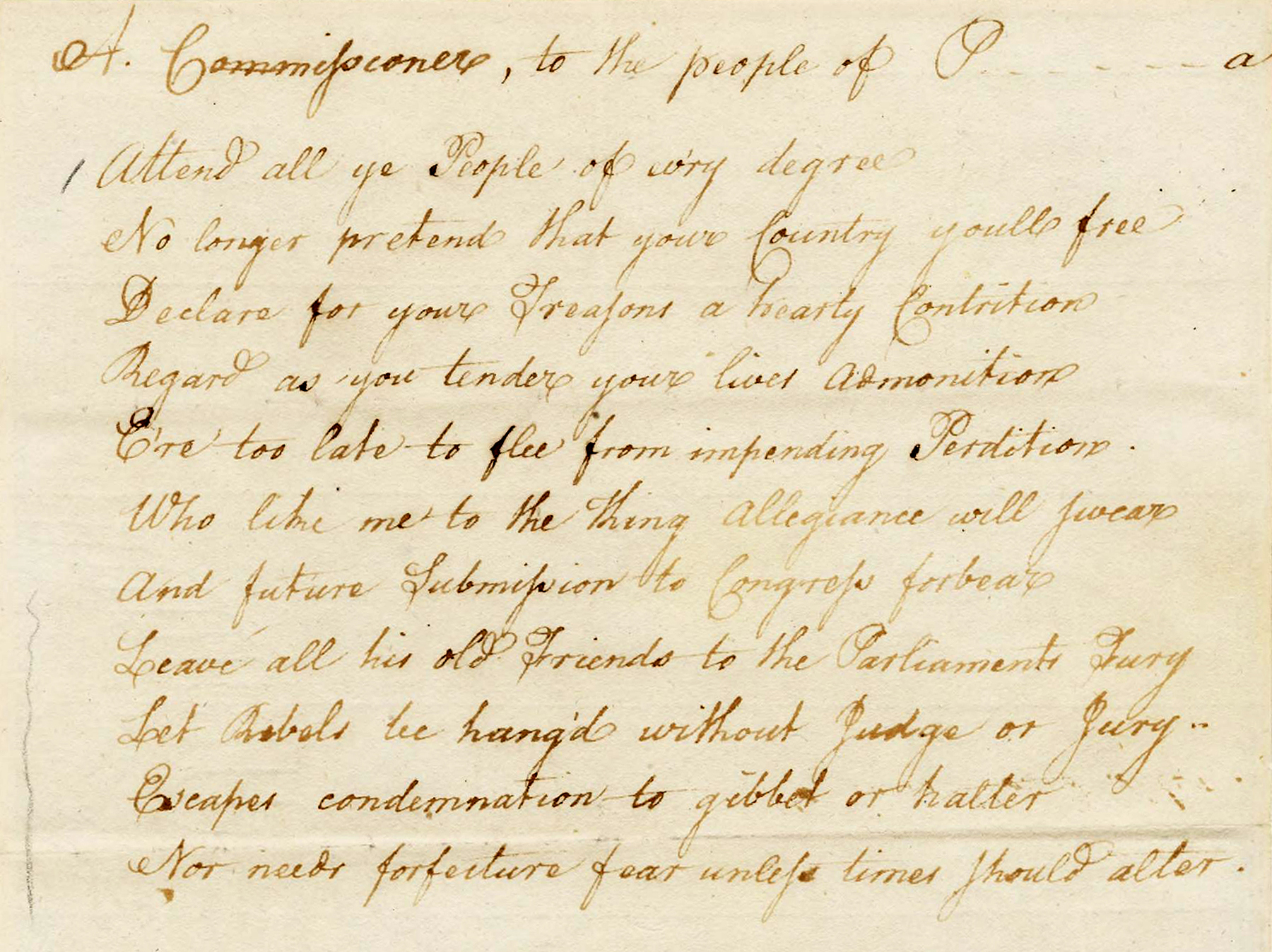George Wythe and Willam Ellery, "Poems on Witty Subjects in Congress," American Revolutionary War Manuscripts Collection, Boston Public Library, MS.Ch.E.8.31-33.[1]
Contents
- 1 Manuscript text, November-December 1776
- 1.1 "A Member of the Antinovanglian Faction to W. E.," by George Wythe (VA)
- 1.2 "A Novanglican to G.W.," by William Ellery (RI)
- 1.3 "Instead of Controlling Our Mary's Cross Humor," by William Ellery
- 1.4 "For Farms in Utopia, the Moon, or Some Fairyland," by George Wythe
- 1.5 "Epigram," by William Ellery
- 1.6 "Answer to Epigram," by George Wythe
- 1.7 "Unless You Will Take One Line for Your Ten," by William Ellery
- 1.8 "You've Not only Quitted Your Arrear," by George Wythe
- 1.9 "A Commissioner, to the People of Philadelphia," by William Ellery
- 2 See also
- 3 References
- 4 External links
Manuscript text, November-December 1776
"A Member of the Antinovanglian Faction to W. E.," by George Wythe (VA)
A member of the antinovanglian faction to W. E.[2]
To works supererogation
By others, some owe their salvation.
To what the good yankees are doing
Their duty beyond, we owe ruin.
Epigram by the ingenious George Wythe Esq
For the two first Lines the author alludes to the Roman Catholics—
In the two first last to the additional Pay, and Bounty of given to
the Soldiers by the Eastern States.
|
|
|
"A Novanglican to G.W.," by William Ellery (RI)
|
A Novanglian to G. W.
As by works supererogatory
Rom. Caths. are saved from purgatory,
So by what the Yankees good are doing
Buckskins will save from utter ruin.
|
|
|
"Instead of Controlling Our Mary's Cross Humor," by William Ellery
|
Instead of controlling our Mary's cross humour
You give what she asks you. Nay, you would do more
For the First Virginia, instead of a manly nobly persisting
Gives up to Mary one Roll for enlisting.
Mary then rising in her wild Demands
The Virginia lays open the Claims about Lands
Nay, more abounding in Supererogation,
She too proposes the Mode of Taxation
To leave as it was before it was debated
For perhaps by this forward might Mary'll be sated.
Pray, what is the Cause of this Indulgence so great
Where Discord and Jarring subsisted of late?
Ill tell you, my Friend, 'tis a truth very serious:
Interest will join States of Sentiments various.
|
|
|
"For Farms in Utopia, the Moon, or Some Fairyland," by George Wythe
|
For farms in Utopia, the moon, or some fairyland
Compensations more worth were offered by Maryland.
In this it's denied our sister's cross humor'd,
Whatever by juntos or patriots be rumor'd.
Her brave men must fight, bleed, and suffer as others,
Leave orphans their dear babes and childless their mothers,
Give full many a fair Penelope heartaches,
Whilst their country of their virtuous earnings partakes
A very small pittance. Why this noise and stir then,
If, lest her shoulders bear too much of the burden,
She reject your unequal mode of taxation,
Demonstrate by numbers, without relaxation,
That ruin is doom'd her, and cries in distraction
She'll yield to the Old, not the New, English faction?
With candor attend to her effiagitation,
And these two demands grant without hesitation.
Virginia must feel for any neighbor oppress'd,
Cannot easy remain til the mischief's suppress'd;
And
|
|
|
|
And if slaves you include in your capitation,
Is equally injur'd, claims like defalcation.
E'en while, it is true, we're somewhat contrarient,
Yet interest will join those of sentiments variant.
And why not? For thence flows that blessing transcendent
All wish for devoutly, a state independent.
Then cease to object to a sister we're tender,
Indulgent with excess, unwilling to mend her,
If we favor petitions founded on reason,
With deference offer'd at convenient season.
Fell discord had too long among us existed.
From our councils cashier'd, if now reenlisted,
It with Tories will league to puzzle our measures
And spoil us of freedom, most precious of treasures.
|
|
"Epigram," by William Ellery
|
Like a Babbler ambitious of some little fame
I follow when Freeman hath started the Game,
But when hunted down poor Puss sinks and dies
I give up to Freeman his Right to the Prize
Let Wythe take the Laurel his Genius demands
I ask but this Book to be classed with his Friends.
W. E.
|
|
|
"Answer to Epigram," by George Wythe
|
With one epigram, though well hit off,
You must not expect, sir, to get off.
I can't for my life give o'er scribbling,
Except whilst I'm dreaming or quibbling.
Scribendi tam dira cupido,[3]
Quam amor quo consumpta Dido.[4]
If Howe, hither marching, friend Ell'ry,
Were near with his train of artill'ry
And bells in the city were chiming,
This strange cacoëthes of rhyming
Would not cease. Tell me not, in answer,
You can't write. It's known you well can, sir,
Proceed then; or haec tibi cura,[5]
I shall draw your caricatura.
If who's the author, dubitatur?
He's your correspondent, Nugator.[6]
|
|
|
"Unless You Will Take One Line for Your Ten," by William Ellery
|
Unless you will take one Line for your Ten
I shall never pay you, and indeed I shan't then.
For to form One good Clink and invita Minerva,[7]
I must ransack turn my poor Brains all quite topsy, turvy.
While you with a Portion of Latin and Greek
As n an An hundred good lines can easily make
As the Virginian Tully[8] can speak.
The muses will readily yield up their Charms
To the Poet that dreads not the Thunder of Arms
They'll favour the brave the youthfull the blythe
Will fly from an Ellery and caress a Wythe
Compelled thus to rhime in my own Defense
These Lines are dictated a Lege Natura
Pray then forbear Sir, your Caricatura
I most humbly submit to your Candour and Sense.
What thus is forced from Me Lege magna Natura[9]
And beg you would forbear Sir your Caricatura
|
|
|
"You've Not only Quitted Your Arrear," by George Wythe
|
You've not only quitted your arrear
But check'd my poetical career.
I flatter'd myself that Apollo
Had told me the Muses to follow.
But they to Parnassus retiring
And frowning forbade my aspiring,
Rejected my awkward addresses,
Bestow'd on my rival caresses,
Made mirth of my passion for soaring,
And laugh'd at my anguish and roaring.
Whilst you mount with wing Pegasean
And, triumphing, sing Io Paean,[10]
With eyes full of envy and surprise,
The laurel, I see, becomes your prize.
My latin and greek not a bawbee
I value (Think not I bedaub ye
With praise, though this seems that way leaning)
When one of your couplets more meaning
Fine sense and true humour you fling in,
Than twenty of mine I can bring in.
|
|
|
"A Commissioner, to the People of Philadelphia," by William Ellery
|
A Commissioner, to the people of P _ _ _ _ _ a
Attend all ye People of wry degree
No longer pretend that your Country youll free
Declare for your Treasons a hearty Contrition
Regard as you tender your lives Admonition
E're too late to flee from impending Perdition
Who like me to the thing Allegiance will swear
And future Submission to Congress forbear
Leave all his old Friends to the Parliaments Fury
Let Rebels be hang'd without Judge or Jury
Escapes condemnation to gibbet or halter
Nor need forfeiture fear unless times should alter.
|
|
|
See also
References
- ↑ See W. Edwin Hemphill, "George Wythe Courts the Muses," William and Mary Quarterly 3rd ser., 9, no. 3 (July 1952), 338-345.
- ↑ "Novanglian": New Englander.
- ↑ "Dire desire to write," paraphrase of Virgil, Aeneid, Book V, line 721.
- ↑ "The love which consumed Dido," Queen of Carthage.
- ↑ Ovid, Ex Ponto III, xxxvi.
- ↑ Jester, clown.
- ↑ Defy nature, literally "go against Minerva's will." Cicero, De Officiis, I, 31, 110.
- ↑ Wythe is a Virginian Cicero: [[wikipedia:Marcus Tullius Cicero|]].
- ↑ A great law of Nature.
- ↑ Classical Greek cry of exultation or triumph, traditionally addressed to Apollo the healer.
External links
